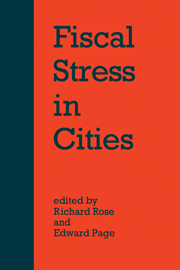Book contents
- Frontmatter
- Contents
- Acknowledgments
- 1 Can Government Control Itself?
- 2 Pressures in Whitehall
- 3 Pressures from Whitehall
- 4 The Decline of Urban Economies
- 5 Local Government as an Employer
- 6 Do Fewer Pupils Mean Falling Expenditure?
- 7 Local Autonomy and Intergovernmental Finance in Britain and the United States
- 8 Chronic Instability in Fiscal Systems
1 - Can Government Control Itself?
Published online by Cambridge University Press: 07 October 2011
- Frontmatter
- Contents
- Acknowledgments
- 1 Can Government Control Itself?
- 2 Pressures in Whitehall
- 3 Pressures from Whitehall
- 4 The Decline of Urban Economies
- 5 Local Government as an Employer
- 6 Do Fewer Pupils Mean Falling Expenditure?
- 7 Local Autonomy and Intergovernmental Finance in Britain and the United States
- 8 Chronic Instability in Fiscal Systems
Summary
Fiscal stress is a symptom that something is wrong in our cities today, and that something should be done to relieve or remove the causes of stress. The problem is that there are more claims upon the public purse for services than there is money to meet these claims. Stress affects the everyday workings of local government, and creates friction in relations between town halls, responsible for delivering many public services, and Whitehall, responsible for many decisions about public spending and service priorities. Ordinary citizens are aware of fiscal stress, simultaneously facing annually escalating bills for local taxes and threats to cut back local services long taken for granted as desirable. Nor is fiscal stress unique to Britain; it is found in the United States and many European countries as well.
The problem of fiscal stress is not simply a dispute about cutting public expenditure or about the need to maintain local services. It is about achieving a balance between the costs and benefits of government. Fiscal stress is the dominant problem facing cities in the 1980s, if only as an unintended consequence of cities seeking to deal with other problems. Local government is a major provider of public policy benefits such as education, housing, roads, social services for the elderly, and police and fire protection. These are usually thought of as ‘good’ goods and services. But providing benefits costs money, lots of money. As the cost of government rises, its need for revenue increases.
- Type
- Chapter
- Information
- Fiscal Stress in Cities , pp. 1 - 16Publisher: Cambridge University PressPrint publication year: 1983

